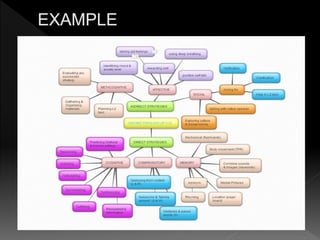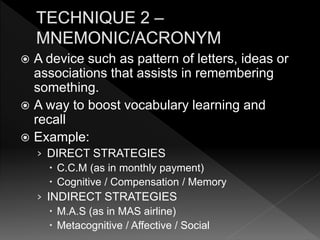3 Memory Techniques for Oxford's LLS Categorization
- 2. DIRECT STRATEGIES INDIRECT STRATEGIES COGNITIVE ŌĆó Reasoning ŌĆó Analyzing ŌĆó Note-taking ŌĆó Summarizing ŌĆó Synthesizing ŌĆó Outlining ŌĆó Reorganizing info ŌĆó Practicing (natural & formal) METACOGNITIVE ŌĆó Planning for L2 task ŌĆó Gathering & Organizing materials ŌĆó Evaluating any successful strategy COMPENSATION ŌĆó Guessing from context (L & R) ŌĆó Synonyms & ŌĆ£talking aroundŌĆØ (S & W) ŌĆó Gestures & pause words (S) AFFECTIVE ŌĆó Identifying mood & level of anxiety ŌĆó Talking about feelings ŌĆó Rewarding oneself ŌĆó Using deep breathing ŌĆó Positive self-talk MEMORY ŌĆó Acronym ŌĆó Rhyming ŌĆó Mental pictures of words ŌĆó Combination of sounds & images (keyword) ŌĆó Body movement (TPR) ŌĆó Mechanical means (flashcards) ŌĆó Location (page/board) SOCIAL ŌĆó Asking for *clarification *verification *help ŌĆó Talking with native speakers. ŌĆó Exploring cultural & norms.
- 4. ’é× MANUAL > In notebook > Use cheerful, interesting & colourful pens ’é× ELECTRONIC > MindJet > Frezi > Xmind > Bubbl.us > Coggle > Mindomo > Freemind > MindNode ’āĀJust pick one you like the best~
- 6. ’é× A device such as pattern of letters, ideas or associations that assists in remembering something. ’é× A way to boost vocabulary learning and recall ’é× Example: ŌĆ║ DIRECT STRATEGIES ’é¢ C.C.M (as in monthly payment) ’é¢ Cognitive / Compensation / Memory ŌĆ║ INDIRECT STRATEGIES ’é¢ M.A.S (as in MAS airline) ’é¢ Metacognitive / Affective / Social
- 7. ’é× The more times you review your notes by testing yourself, the longer you will remember the information ’é× It is important to space out review session (30 min per day is better than 3x in a row for 90 min) ŌĆō the ideal spacing is: ŌĆ║ 1st review = 5-10 min after learning ŌĆ║ 2nd review = later the same day ŌĆ║ 3rd review = one week later ŌĆ║ 4th review = one month later ŌĆ║ 5th review = just before exam
- 8. There are so many other memory techniques out there that you apply in your study. Check out the website add below to see more memory techniques that can help you in your quest. https://www.eastcentral.edu/common/assets/im proveyourmemory.pdf Until then, good luck and remember to have fun in your learning~ Adios!!








